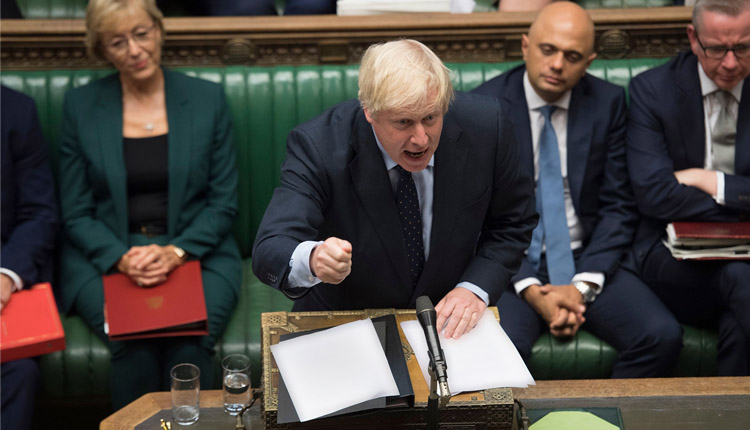British Prime Minister Boris Johnson’s government abandoned attempts in the upper house of parliament to block a law aimed at stopping the country from leaving the European Union without a deal.
The move paved the way for Johnson being required to ask the EU for a three-month extension to the Brexit deadline, if he fails to reach a renegotiated transition deal with the bloc by the middle of October.
Johnson has said he is opposed to an extension and that he is prepared to take Britain out of the EU without a deal if necessary.
Conservative Party members of the upper house of parliament had tabled a series of amendments in an attempt to run down the clock on the delay bill and prevent it being passed before parliament is suspended on Monday.
But in the early hours of Thursday, the government in the upper house, known as the House of Lords, announced it was dropping its opposition to the legislation.
Richard Newby, an opposition member of the Lords, who had taken his duvet to parliament in preparation to spend the night discussing the law, said the government dropped its opposition after suffering heavy defeats on some of the proposed amendments.
“There was a realization by those on the other side that this was more than usually stupid, and they were looking stupid, and we needed to find a way forward,” he told BBC Radio.
U.K. Prime Minister Boris Johnson has not had the best week with parliament defeating his Brexit plans.
First, by taking control of the parliamentary agenda, then by passing legislation to prevent a no-deal Brexit – effectively forcing the prime minister’s hand when it comes to Brexit – and finally, on Wednesday night, scuppering his plan for a snap election – for now.
After taking control of parliamentary business on Tuesday, a majority of MPs then on Wednesday approved a bill forcing the prime minister to ask the European Union (EU) for another delay to the U.K.’s departure date, pushing Brexit back to January 31, 2020, if there is no withdrawal agreement approved by October 19.
“Johnson has lost control,” Chris Scicluna and Emily Nicol, economists at Daiwa Capital Markets, said Wednesday.
“After a mere two days of parliamentary scrutiny as Prime Minister, Johnson has already lost control of the House of Commons, the Brexit process, and the fate of his government,” they said in a note.
Johnson has maintained since becoming prime minister in July that the U.K. will leave the EU on October 31 “come what may” despite no Brexit deal being agreed in parliament.
He had argued that it was crucial to keep a no-deal Brexit option on the table in last-ditch talks with the EU to try to get a deal that could be approved by the U.K.
parliament.
But, as promised if he was defeated, Johnson put forward a motion calling for a snap election, mooted for October 15, but he failed to get the support of two-thirds of parliament needed to hold a vote as the main opposition Labour Party instructed its MPs to abstain from the vote.
The U.K. leader could still try other options to force an election. The government could try to bypass legislation requiring a two-thirds majority to approve a snap election. It has even been mooted that Johnson could call a vote of no confidence in his own government and then call on his MPs (Members of Parliament) to abstain from the vote although this is seen as extremely unlikely.


